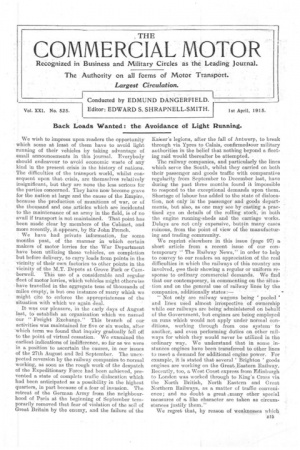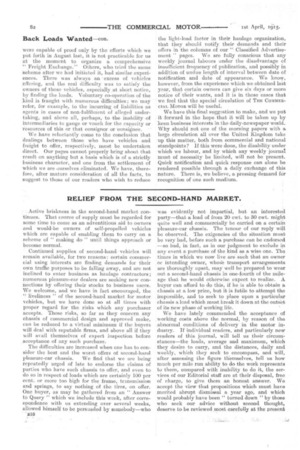Back Loads Wanted : the Avoidance of Light Running.
Page 1

Page 2

If you've noticed an error in this article please click here to report it so we can fix it.
We wish to impress upon readers the opportunity which some at least of them have to avoid light running of their vehicles by taking advantage of • small announcements in this journal. Everybody should endeavour to avoid economic waste of any • kind in the present crisis in the history of nations. The difficulties of the transport world, whilst consequent upon that. crisis, are themselves relatively insignificant, but they are none the less serious for the parties concerned. They have now become grave for the nation at large and the cause of the Empire, because the production of munition's of war, or of the thousand and one _articles which are incidental to the maintenance of an army in the field, is of no avail if transport is not maintained. That point has been made clear by members of the Cabinet, and more recently, it appears, by Sir John French.
We have had private information, for some months past, of the manner in which certain makers of motor lorries for the War Department have been utilizing those vehicles, on completion but before delivery, to carry loads from points in the vicinity of their own factories to other points in the vicinity of the M.T. Depots at Grove Park or Cam • berwell. This use of a considerable and regular -fleet of motor lorries, which vehicles might otherwise • have travelled in the aggregate tens of thousands of miles empty, is but one instance of many which we might cite to enforce the appropriateness of the situation with which we again deal.
It was our pleasure, in the early days of August last, to establish an organization which we named our " -Freight Exchange." This branch of our activities was maintained for five or six weeks, after 'which term we found that inquiry gradually fell off to the point of virtual cessation. We examined the earliest indications of indifference, so far as we were in a position to ascertain the Causes, in our issues of the 27th August and 3rd September. The unexpected reversion by the railway companies to normal working, as soon as the rough work of the despatch of the Expeditionary Force had been achieved, prevented a state of complete traffic dislocation which had been anticipated as a possibility in the highest quarters, in part because of a fear of invasion. The retreat of the German Army from the neighbourhood of Paris at the beginning of September temporarily removed that fear of violation of the soil of Great Britain by the enemy, and the failure of the Kaiser's legions, after the fall of Antwerp, to break through via Ypres to Calais, -confirmethour military authorities in the belief that nothing beyond a fleeting raid would thereafter be attempted. The railway companies, and particularly the lines which serve the South, whilst they carried on both their passenger and goods traffic with comparative regularity from September to December last, have during the past three months found it impossible to respond to the exceptional demands upon them. Shortage of labour has added to the state of dislocation, ncyt only in the passenger and goods departments, but also, as one may see by casting a practised eye. on details of the rolling stock, in bath the engine running-Sheds and the carriage works. Delays are not only expensive, butsiin many cases ruinous, from the point of view of the manufacturing and trading community.
We reprint elsewhere in this issue (page 97) a short article from a recent issue of our contemporary " The Railway News," in order to help to convey to our readers an appreciation of the real difficulties in which the railways of this country are involved, qua their showing a regular or uniform response to ordinary commercial demands. We find that our contemporary, in commenting on the-situa • tion and on the general use of railway lines by the companies, additionally states :ea• " Not only are railway wagons being pooled ' • and lines used almost irrespective of ownership while our railways are being administered on behalf of the Government, but engines are being employed on runs which would not apply under normal conditions, working through from one system to andther, and even performing duties on other rail. ways for which they would never be utilized in the ordinary way. We understand that in some instances engines have been transferred to other lines to meet a demand for additional engine power. For example, it is stated that several Brighton ' goods engines are" working on the Greatastern Railway. Recently, too, a West Coast express from Edinburgh to London was worked through to King's Cross via the North British, North Eastern and Great Northern Railways, as a matter of traffic convenience; and no doubt a, great :many other special measures of a, like character are taken as circumstances justify them."
We regret that, by reason of weaknesses which were capable of proof only by the efforts which we put forth in August last, it is not practicable for us at the moment to organize a comprehensive " Freight Exchange." Others, who tried the same Scheme after we had initiated it, had similarexperiences. There was always an excess of vehicles ,offering, and the real difficulty was to satisfy the owners of those vehicles, especially at short notice, by finding the loads. Voluntary co-operation of the kind is fraught with numerous difficulties; we may refer, for example, to the incurring of liabilities as agents in cases of non-fulfilment of alleged undertaking, and above all, perhaps, • to the inability -of intermediaries to gauge OT vouch for the .capacity or resources of this or that consignor or-consignee.
We have reluctantly come to the conclusion that dealings between those Who have vehicles • and freight to offer, respectively, must be undertaken direct. Our pages cannot properly bring about that result on anything but a basis which is of a strictly buSiness character, and one from the settlement of which we are ourselves eliminated. We have, therefore, after mature consideration of all the facts, to suggest to those of our readers who wish to reduce the light-load factor in their haulage organization, that they should. notify. their demands and their offers in the columns of our "Classified. Advertisement " pages. We are. fully conscious that any weekly journal labours under the disadvantage of insufficient frequency of publication, and possibly in addition of undue length of interval between date of notification and date of appearance. We know, however, from the experience which we obtained. last year, that certain owners can give six days or more notice of their wants, and it is in those cases that we feel that the special circulation of Tun COMMERCIAL MOTOR will be useful.
We have this final suggestion to make, and we put it forward in the hope that it Will be taken up by keen business interests in the daily-newspaper world. Why should not one of the morning papers with a large circulation all over the United Kingdom take up this matter, both from commercial and national standpoints? If this were done, the disability under which we labour, and by which any weekly journal must of necessity be limited, will not be present. Quick notification and. quick response can alone be rendered passible through a daily exchange of this nature. There is, we believe, a pressing demand for recognition of one such medium.




















